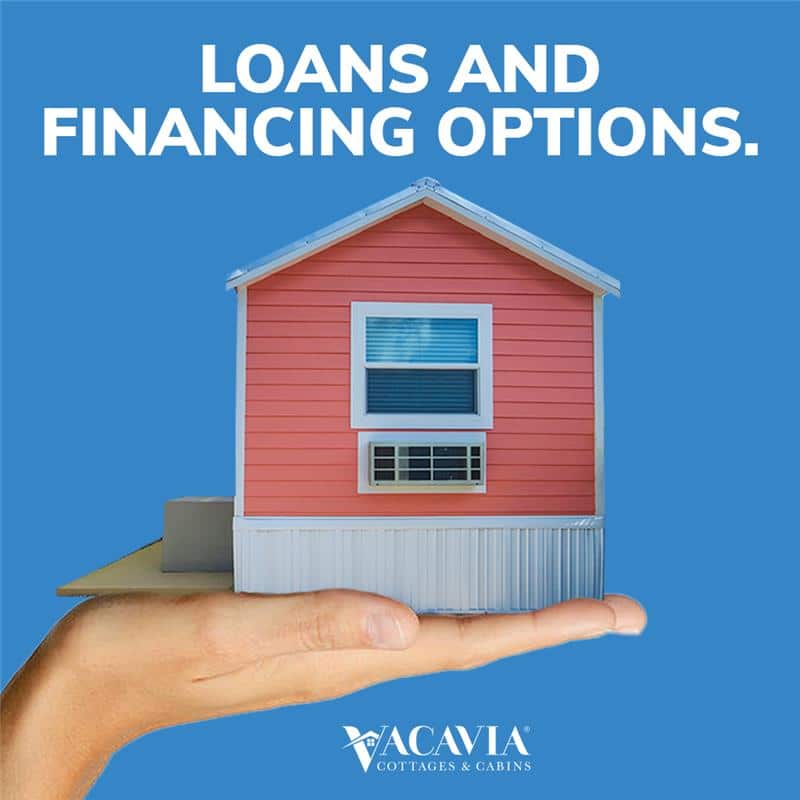Campground & RV Park Expansion: Loans & Financing Options
As the demand for unique and compact accommodations rises, many campground and RV park owners are considering the addition of cabins, cottages, and tiny homes to upgrade and expand and their offerings. This can significantly boost bookings by attracting a wider range of guests which will, in turn, boost revenue and customer satisfaction. However, the upfront investment can be substantial.
Understanding the available financing options is essential for making informed decisions to facilitate a successful expansion. Businesses must evaluate different funding avenues to determine the most suitable choice for their needs. This article explores various financing avenues, with a focus on the advantages of in-house financing.

Financing Options for Your Expansion
Financing for cabins, cottages, and tiny homes generally falls into several categories:
Traditional Bank Loans: These loans, offered by banks and credit unions, often require a strong credit history, detailed business plan, and significant collateral. They may offer competitive interest rates but can be challenging to secure, especially for smaller businesses or those with a limited operating history.
Personal Loans: Unsecured personal loans are a common choice for financing tiny homes. These loans do not require collateral, making them accessible for many borrowers. However, interest rates can vary based on creditworthiness (Rocket Mortgage, 2024). A personal loan can be a convenient way to finance a tiny home, but its shorter repayment term often results in higher monthly payments compared to a mortgage. The interest rate, typically ranging from 3% to 36% APR, depends largely on the borrower’s credit profile, with those having good or excellent credit securing lower rates (Rocket Mortgage, 2024).
RV Loans: If the structure is mobile and meets specific criteria, it may qualify for an RV loan. These loans often offer longer repayment terms and may require the home to be certified as roadworthy. An RV loan typically offers a longer, more manageable repayment term than a personal loan but may require a down payment. Since the tiny home serves as collateral, defaulting could result in the lender seizing the property (Rocket Mortgage, 2024).
Small Business Administration (SBA) Loans: The SBA doesn’t directly lend money but guarantees a portion of loans made by participating lenders. This reduces the risk for lenders, making them more willing to finance small businesses (SBA.gov). SBA loans can offer favorable terms and lower interest rates than traditional loans, but the application process can be complex (Citizens Bank, 2025).
Commercial Real Estate Loans: If the cabins, cottages, or tiny homes are considered real estate improvements, you might be eligible for a commercial real estate loan. These loans are typically secured by the property itself (OCC.gov).
Equipment Financing: In some cases, if structures like manufactured or modular homes are considered movable personal property, equipment financing, such as a chattel mortgage, might be an option. In a chattel mortgage, the movable property itself serves as collateral for the loan (Rocket Mortgage, 2024).
Credit Cards: Although not typically recommended due to high-interest rates, some may consider using credit cards for smaller expenses related to the build or purchase. The Consumer Financial Protection Bureau (CFPB) advises that credit card interest rates can be significantly higher than other forms of credit, making it essential to have a clear plan to pay off the balance promptly to avoid accruing significant interest (Consumer Financial Protection Bureau).
In-House Financing: This option involves the seller (in this case, the manufacturer or builder of the cabins, cottages, or tiny homes) providing financing directly to the buyer (the campground or RV park owner).
In-House Financing and Its Advantages
In-house financing, also known as seller financing, can be a particularly attractive option for campground and RV park owners. It offers several key advantages:
- Increased Accessibility: In-house financing can be more accessible than traditional bank loans, especially for businesses with limited credit history or those that may not meet the stringent requirements of traditional lenders. Sellers may have more flexible lending criteria (Vergent LMS).
- Faster Closing Process: The approval and closing process for in-house financing is often significantly faster than going through a bank or other financial institution. This allows you to get your new accommodation up and running sooner.
- Flexible Terms: Sellers may be willing to negotiate more flexible terms, such as lower down payments or customized repayment schedules, to suit the specific needs of the buyer.
- Direct Relationship: Dealing directly with the seller can foster a stronger working relationship and facilitate smoother communication throughout the financing process.
- Less Strict and Simplified Paperwork: In-house financing may have less strict requirements compared to bank loans. In-house financing often involves less paperwork and fewer regulatory hurdles than traditional lending (Steyerberg, 2024).
A Win-Win Scenario
In-house financing can be a mutually beneficial arrangement. It allows campground and RV park owners to acquire the necessary structures to expand their business, while also providing the seller with a steady stream of income from the loan repayments.

Vacavia Cottages and Cabins Offers In-House Financing

Vacavia Cottages and Cabins understands the challenges of securing financing for expansion projects. That’s why we offer in-house financing options to qualified individuals and campground and RV park owners. Contact us today to learn more about how we can help you finance your business expansion.
References:
Rocket Mortgage, 2024. Tiny Home Financing and Loan Options. https://www.rocketmortgage.com/learn/tiny-home-financing
Citizens Bank, 2025. 5 important steps to take when applying for an SBA loan. https://www.citizensbank.com/learning/steps-to-take-when-applying-for-an-sba-loan.aspx
Small Business Administration (SBA.gov), 2024. Fund your business. https://www.sba.gov/business-guide/plan-your-business/fund-your-business
Office of the Comptroller of the Currency (OCC.gov), 2022. Commercial Real Estate Lending Version 2.0. https://www.occ.gov/publications-and-resources/publications/comptrollers-handbook/files/commercial-real-estate-lending/pub-ch-commercial-real-estate.pdf?utm_source=chatgpt.com
Consumer Financial Protection Bureau, n.d. 1026.52 Limitations on fees. https://www.consumerfinance.gov/rules-policy/regulations/1026/52/
Vergent LMS, n.d. The Ins and Outs of In-House Financing. https://www.vergentlms.com/the-ins-and-outs-of-in-house-financing/
Steyerberg, 2024. In House Financing VS Bank Financing. https://treasuryxl.com/blog/in-house-financing-vs-bank-financing/

